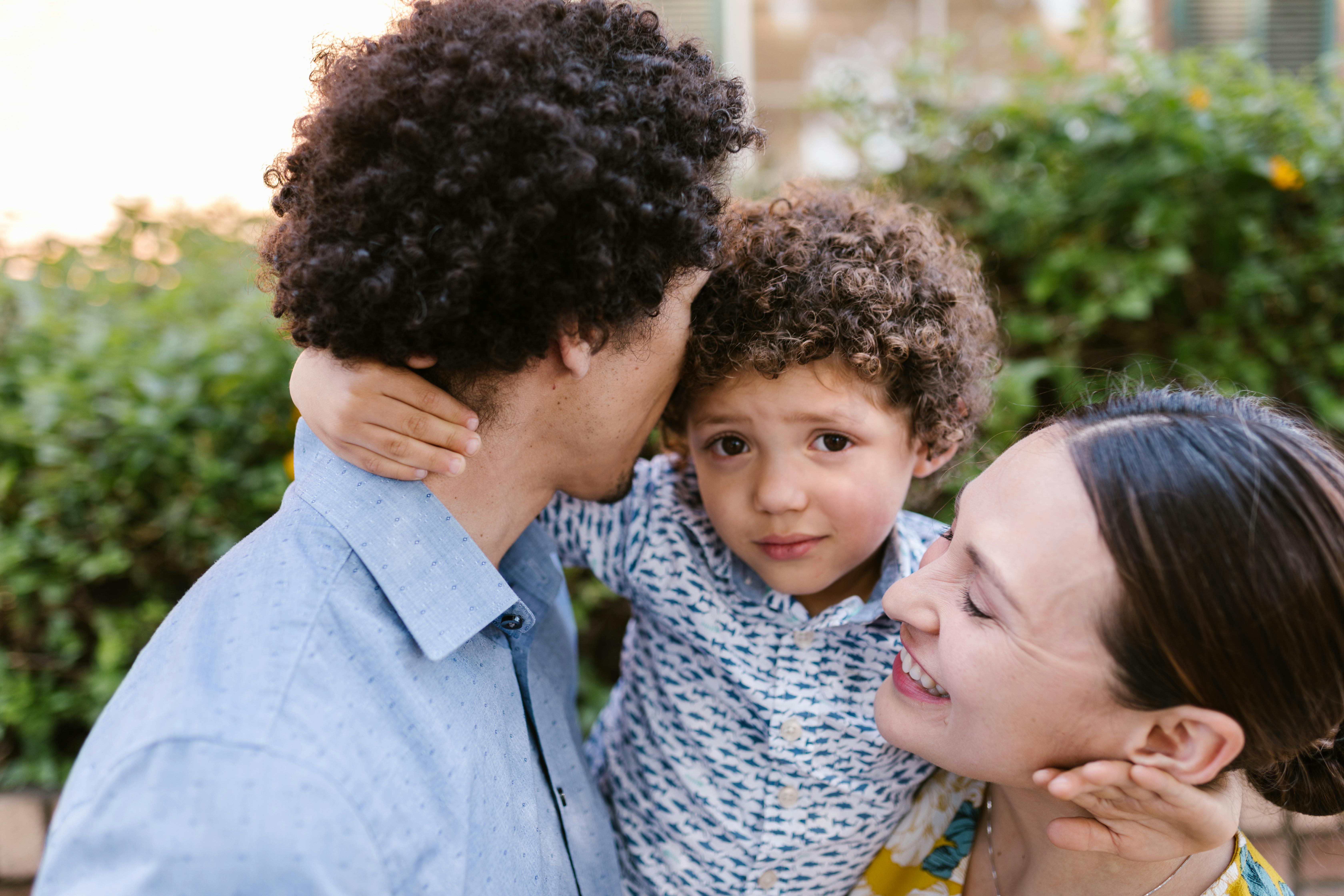8 Ways to Raise an Emotionally Secure Child
Looking for helpful ways to raise an emotionally secure child?
One of the good things about the internet is that we can get information as fast as we can type.
This also means that there is a lot of misinformation floating around about how to raise an emotionally secure child.
Helping your child name, understand, and process emotions without fear or overwhelm is HARD work sometimes.
The importance of doing the work, however, goes far beyond your child.
Your child will sleep better, eat better, express themselves more, have better relationships, and do better in school if they feel emotionally secure.
As a result, YOU will feel more peaceful, balanced, and sure of yourself.
Let’s stop and define “emotionally secure” for a moment.
Being emotionally secure means that we feel safe to express our feelings without fear or shame.
Being emotionally secure, for kids, means that they feel safe and secure in the knowledge that their parents will not leave or intentionally hurt them.
With that, let’s get into it!
Related: The Ultimate Guide to Positive and Negative Reinforcement for Parents

1. Don’t Threaten to Leave Your Kids Behind
We have all been there: It’s time to leave the party and your kids just won’t go.
They yell “NO!” and run away or ignore you altogether. All of this undoubtedly frustrates or even enrages you.
After all, none of us like to be yelled at or ignored and certainly not by our little people.
Because you don’t want to yell or carry your child kicking and screaming to the car (you can’t carry older kids anyway), it can be tempting to just say “I’m leaving” and begin to walk out the door, hoping that your child will follow you.
What usually happens, though, is that your kid panics and runs to you with desperation on their little face.
A child’s feeling of attachment to you is one of the most important things in the early years.
Threatening to leave them behind (even if you never would) can really shake thier feeling of security and belief that you will always be there.
It may seem like a silly, empty threat; kids don’t know yet that you won’t leave. They’re new to the world, after all.
Instead of threatening to leave, help them prepare to leave. Involving your kid in the countdown process can help. You can say “We have to go in five minutes” and then warn them every minute, if you have to.
Because young children don’t have a good sense of time, you can say “Two more times down the slide and then we have to go”.
A lot of kids can get into this mode of ending playtime, even if the departure still produces tears or protests.
That’s when you can say “I know it’s hard to leave, you were having so much fun” and gently guide them out.
2. Tell Them the Truth, No Matter What
We all want to protect our children from the vicissitudes of life.
The inherent suffering of life is relatively easy to mitigate when kids are very small and we can meet their every need.
It is important to tell kids the truth because they will figure out the truth eventually, because you want them to trust you, and because they can handle it.
Examples of this include telling the truth when a friend, family member, or pet dies, telling the truth about names for body parts, telling the truth about how you feel.
No, Grandma isn’t away on a long trip, nobody’s genitalia is a “pee-pee” or a “woo-woo”, and children can tell when you’re sad or mad (so it’s okay to tell them).
Remember that children are resilient and can handle the truth-as long as it’s age appropriate, of course.
Even the smallest of children can understand that when someone dies, it means that they aren’t coming back.
They may ask when the deceased is coming back, and you can always remind them that they have died and aren’t coming back.
It is okay if this makes your kid sad. It IS sad, isn’t it?
It is, of course, okay to soften the blow as you see fit, including talking about heaven if that is within your belief system.
You can also say that they are in a better place, where they aren’t sick anymore.
Please tell your children the correct names for parts of their bodies!
It’s healthy and natural to have genitals AND it keeps them safe.
If your child can comfortably tell you that someone touched their (insert name) clearly and confidently-they are safer, plain and simple.
It also helps them mitigate shame about their bodies by naming all of the parts of their bodies correctly.
Calling things by nicknames sends the message that those parts are funny, weird, gross, or scary-the parts that shall not be named.
Children are incredibly perceptive. I promise that they already know that you aren’t yourself.
It’s okay to say “Mommy is feeling overwhelmed today and it’s not your fault, but it means that I can’t play right now.”
This models good communication skills and lets them know that you aren’t mad at them.
Kids tend to think that everything is their fault, so reminding them that it’s not their fault can never be said enough.
You can also tell them that you are sad or stressed or frustrated or tired!
Telling them in simple, understandable ways will help them learn to verbalize how they are feeling, which will serve them so well.
You are human and you’re not always going to be happy-and that’s okay.
Related: How to Stop Yelling at Your Kids
3. Don’t Try to Make Their Feelings Go Away
When our little ones have big feelings, it can be so hard to handle our own overwhelm and frustration.
We think of toddlers and their tantrums as the biggest expression of feelings, but ALL kids (especially teenagers) have big feelings-and they will undoubtedly be directed at you sometimes.
Even if they aren’t directed at you, it’s always hard to see our kids hurting, right? My heart breaks every time.
But, telling kids that to stop crying, that they’re overreacting, that they are “dramatic”-all result in feelings of shame for your kid.
I see teenagers and adults of all ages in my office, every day, who struggle to express themselves because the residual shame of being called “dramatic” is so overwhelming.
Here’s what I want you to do:
Next time your child is yelling, crying, whining, or melting down-take a deep breath, put your hand on your heart, close your eyes, and say “I am safe, I am loved, and this is not an emergency”.
When we experience anger, rage, or panic in response to our child’s distress, it is related to what YOU experienced as a child when you were upset.
If you were sent to your room when you were angry to process alone, you may find your child’s anger terrifying because you learned that anger meant isolation and temporary rejection.
If you were constantly told that things were “no big deal” when you were upset, your child’s tears over having itchy pants on may feel enraging if you were consistently told that your frustrations were “no big deal” and that you should “get over it”.
The good news is that knowing yourself well and understanding why your child’s upset is so damn upsetting to you will go a long way in helping you calm your nervous system when your kid is overwhelmed.
Kids have BIG feelings (sometimes about small things) and YOU have the power to be their port in the storm.
Related: The Ultimate Guide to Positive and Negative Reinforcement for Parents
4. Understand What to Expect, by Age
One of the things that often trip us up is expecting too much from our kids, too soon.
I have a child who seems older than he is, at times.
It can be easy to think that he should be able to do things that older kids can do.
Because our children want to please us, he will attempt to rise to the expectation.
When he can’t do it or can’t handle it, he dissolves into tears of frustration and disappointment.
Does any of this sound familiar?
The best thing that you can do is have a basic understanding of child development (a great book here) so that you know what’s possible and what is too much.
Children of all ages have underdeveloped brains and are sure to make mistakes.
How you understand and handle the mistakes make all the difference because the things we say to our kids become their inner voices.
Always ask if you can help and listen to kids when they tell you that they can’t yet master what you’ve asked them to do.
5. Don’t Overreact when a Mistake is Made
You undoubtedly have a general idea of what behavior is okay and what isn’t in your home.
When rules are broken, the way you respond makes a huge difference.
Harsh words and punishments make kids angry and resentful.
They may curb the “bad” behavior, but they won’t remember why they shouldn’t do it.
They will only remember that they will be punished if they do it.
Knowing that your kids WILL mess up can help you take things in stride.
A good rule of thumb is this:
If your child is in danger or putting another child in danger, gently remove your child from the situation and say “I won’t let you hurt me/them/it”.
Young children do not have enough impulse control or understanding to stop themselves without your help.
Another good thing to remember is that you were young once, too.
Try to remember what it was like to be young, experiencing the world for the first time.
Older kids will make mistakes, too, and it doesn’t mean that you are failing as a parent.
It also doesn’t mean you have a bad kid.
Trying to understand what happened and why can help your child talk to you without fear or shame.
Childhood IS the space to try and fail in a safe environment.
Be their soft place to land.
Related: How to Stop Yelling at Your Kids
6. It’s More Than Okay to “Baby” your Babies
Babies cry because something is wrong.
Comforting them by holding them or carrying them is an important way to help them feel secure.
Dr. Tovah Klein, the Director of the Barnard Toddler Center at Columbia University points out that “you can’t spoil a baby by holding them or responding to them too much. Research shows just the opposite. Babies who receive more sensitive and responsive care (so their needs are responded to)become the more competent and independent toddlers.”
You are your baby’s anchor.
So go ahead and snuggle your little one anytime!
7. Let Them Express Their Individuality
I know this is a hard one sometimes.
Our children weren’t born to be just like us.
They were born to grow into their beautiful selves.
Kahlil Gibran said:
Your children are not your children.
They are the sons and daughters of Life’s longing for itself.
They come through you but not from you,
And though they are with you yet they belong not to you.
You may give them your love but not your thoughts,
For they have their own thoughts.
You may house their bodies but not their souls,
For their souls dwell in the house of tomorrow, which you cannot visit, not even in your dreams.
You may strive to be like them, but seek not to make them like you.
For life goes not backward nor tarries with yesterday.
You are the bows from which your children as living arrows are sent forth.
The archer sees the mark upon the path of the infinite, and He bends you with His might that His arrows may go
swift and far.
Let your bending in the archer’s hand be for gladness;
For even as He loves the arrow that flies, so He loves also the bow that is stable.
As much as you are able, support and celebrate your child’s individuality.
They will truly thank you for it.

8. Apologize to your Kids
We have all yelled when we didn’t want to, snapped a little too harshly, and let our stress get the best of us.
Honestly, many of us have done or said things that we are not at all proud of.
First, remember that you’re human and you can’t possibly be perfect.
Then, go apologize to your child.
Apologizing does not, in any way, negate the fact that your child may have done something wrong.
Two things can be true at once.
Apologizing for the way you responded shows your child that apologizing is normal and that it’s okay to make mistakes.
I promise that, if you have startled, scared, or overly stressed your little one with your reaction, they will never remember the lesson-only the emotions.
Try it next time you do something you aren’t happy about.
Watch your child melt.
Related: How to Stop Yelling at Your Kids
What to Know Going Forward
If all of this is foreign to you, it’s okay.
Hopefully this comprehensive list of ways to raise an emotionally secure child is leaving you inspired to implement some on your own.
Maybe try one thing this week. Try it on and see how it feels.
Your own history informs so much of your parenting.
I can speak from experience-doing things differently than your parents did is HARD work.
If you need additional help, please don’t hesitate to reach out to a therapist.
We are here to help.
